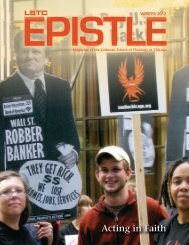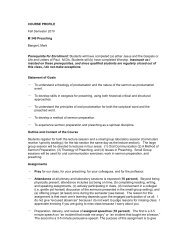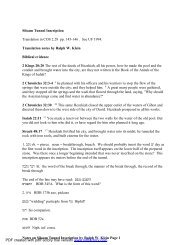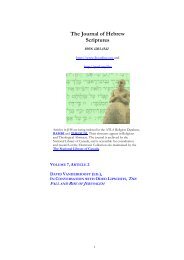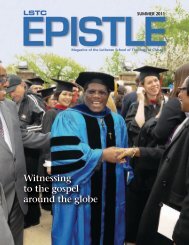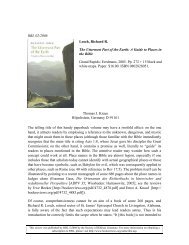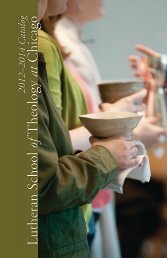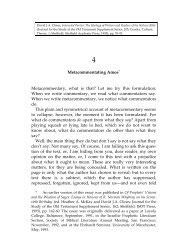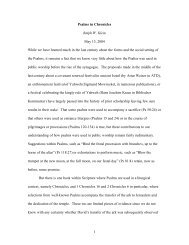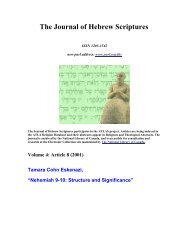The Ironic End of Joash in Chronicles - Fontes - Lutheran School of ...
The Ironic End of Joash in Chronicles - Fontes - Lutheran School of ...
The Ironic End of Joash in Chronicles - Fontes - Lutheran School of ...
You also want an ePaper? Increase the reach of your titles
YUMPU automatically turns print PDFs into web optimized ePapers that Google loves.
8. GKC 158b. Cf. Gen. 30:18; 31:49; 34:13; 1 K<strong>in</strong>gs 8:33.118 Ralph W Kle<strong>in</strong>1. <strong>The</strong> Chronicler omits the synchronism with the northern k<strong>in</strong>gdom as he doesthroughout his work.2. <strong>The</strong> Deuteronomistic Historian had affirmed that <strong>Joash</strong> was faithful throughout hislife, subject only to the limitation described <strong>in</strong> v. 4. <strong>The</strong> Chronicler, however, limitedthis fidelity to the lifetime <strong>of</strong> the priest Jehoiada and recorded the significantmisdeeds <strong>of</strong> <strong>Joash</strong> <strong>in</strong> vv. 17-22. <strong>The</strong>se faults provide a theological explanation forthe Aramaean <strong>in</strong>vasion (vv. 23-24) and the k<strong>in</strong>g's assass<strong>in</strong>ation (vv. 25-26).3. <strong>The</strong> limitation placed on <strong>Joash</strong>'s uprightness by 2 K<strong>in</strong>gs 12:4 was omitted by theChronicler, who has divided the life <strong>of</strong> <strong>Joash</strong> <strong>in</strong>to two periods, <strong>in</strong> the first <strong>of</strong> which,before the death <strong>of</strong> Jehoiada, the k<strong>in</strong>g was completely upright.'4. <strong>The</strong> additional <strong>in</strong>formation <strong>in</strong> <strong>Chronicles</strong> about <strong>Joash</strong>'s wives and children lo showsthat <strong>Joash</strong> lived under God's bless<strong>in</strong>g <strong>in</strong> the first period <strong>of</strong> his life and that his wives,s<strong>in</strong>ce chosen by the high priest himself, were permissible. S<strong>in</strong>ce Jehoiada chose onlytwo wives for the k<strong>in</strong>g, <strong>Joash</strong> <strong>in</strong> the Chronicler's eyes apparently did not transgressDeut. 17:17; two is hardly the "many wives" <strong>of</strong> which Deuteronomy warns. Whilesome scholars would attribute this <strong>in</strong>formation on <strong>Joash</strong>'s family to the source cited<strong>in</strong> v. 27, 11 it is important to note how general and vague this <strong>in</strong>formation is, reveal<strong>in</strong>gno detailed knowledge <strong>of</strong> the k<strong>in</strong>g's life. 129. <strong>The</strong> limitation on a k<strong>in</strong>g's righteousness by referr<strong>in</strong>g to ongo<strong>in</strong>g worship at highplaces is recorded for six k<strong>in</strong>gs <strong>in</strong> the Deuteronomic History. In two cases, the Chroniclerrepeats the <strong>in</strong>formation from K<strong>in</strong>gs (2 Chron. 14:17 // 2 K<strong>in</strong>gs 15:14 and 2 Chron. 20:33// 2 K<strong>in</strong>gs 22:43). <strong>The</strong> Chronicler's treatment <strong>of</strong> the other three passages, <strong>in</strong> addition to 2K<strong>in</strong>gs 12:4, seems also to be motivated by theological considerations. He omits thereference to high places under Amaziah (2 K<strong>in</strong>gs 14:4; cf. 2 Chron. 25:2) s<strong>in</strong>ce this k<strong>in</strong>g'slife, like <strong>Joash</strong>'s, was divided <strong>in</strong>to good and bad periods, with the bad period beg<strong>in</strong>n<strong>in</strong>g at2 Chron. 25:14. <strong>The</strong> reference to high places <strong>in</strong> the account <strong>of</strong> Azariah/ Uzziah (2 K<strong>in</strong>gs15:4; cf. 2 Chron. 26:3) was also omitted because <strong>of</strong> the Chronicler divid<strong>in</strong>g Uzziah's life<strong>in</strong>to good and bad periods. In the reign <strong>of</strong> Jotham (2 K<strong>in</strong>gs 15:35), the Chronicler rewrotethe verse as he compared the k<strong>in</strong>g to his father Uzziah: "Only he did not <strong>in</strong>vade thetemple <strong>of</strong> Yahweh, and still the people acted corruptly" (2 Chron. 27:2). <strong>The</strong> latter clauseis the Chronicler's recast<strong>in</strong>g <strong>of</strong> the reference to the high places. Auld, K<strong>in</strong>gs withoutPrivilege, 86-88, <strong>in</strong>terprets the four omissions by the Chronicler, <strong>in</strong> fact, as additions tothe shared text by the author <strong>of</strong> K<strong>in</strong>gs. I plan to publish <strong>in</strong> another context a completediscussion <strong>of</strong> Auld's <strong>in</strong>terpretation <strong>of</strong> the references to the high places, which heconsiders a "crucial illustration" <strong>of</strong> his case.



